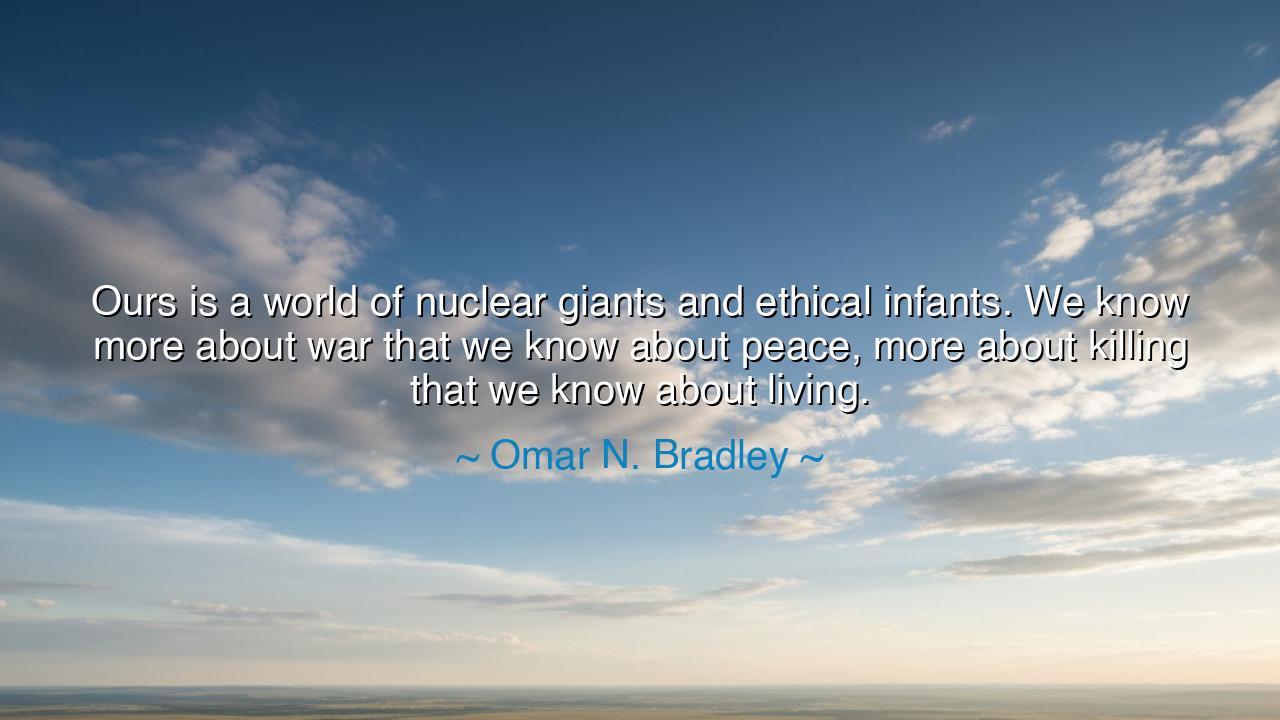
Ours is a world of nuclear giants and ethical infants. We know
Ours is a world of nuclear giants and ethical infants. We know more about war that we know about peace, more about killing that we know about living.






The words of Omar N. Bradley — “Ours is a world of nuclear giants and ethical infants. We know more about war than we know about peace, more about killing than we know about living.” — sound as both lament and warning, thunder rolling from the heart of a soldier who had seen too much of mankind’s folly. Spoken in the aftermath of the Second World War and the dawn of the nuclear age, these words testify that humanity, though mighty in knowledge, remains frail in wisdom. We wield the power of gods, yet the hearts of children; we hold in our hands the fire of the stars, yet stumble in the dark when asked how to love, how to forgive, how to live together without destruction.
Bradley, a general who commanded armies, was not blind to the valor and the price of war. He spoke not as an idealist untouched by conflict, but as one who had tasted its bitter fruit. The nuclear giants are the nations armed with weapons of unimaginable force — powers that could erase cities in an instant, level mountains, turn night into blinding day. Yet what use is such power when the wielders remain ethical infants, unable to master their greed, their anger, their thirst for dominance? His words reveal the tragic paradox of modern man: advanced in knowledge, but stunted in morality.
Consider the bombing of Hiroshima and Nagasaki. With the birth of the atomic age, mankind achieved a terrible greatness: the ability to end itself. In those two flashes of light, tens of thousands of lives were snuffed out, and generations bore the scars. Yet even after witnessing such horror, nations raced to build arsenals larger and deadlier still. The science advanced, but the conscience lagged behind. Truly, Bradley’s warning proved prophetic — humanity had become a nuclear giant, but remained an ethical infant.
This is not a new truth, but one magnified by modern weapons. Throughout history, men have often perfected the art of destruction faster than the art of living. Rome, with all its grandeur, built highways to move legions more swiftly than merchants; Mongol riders swept across continents faster than wisdom could temper their blades. Yet never before had the imbalance been so extreme, never before had the power to kill so vastly outpaced the knowledge of how to live in peace. In Bradley’s age, as in ours, the abyss yawns wider.
But his words are not only warning; they are a call to maturity. If we are to survive, then mankind must grow beyond infancy. We must learn that the measure of greatness is not in the reach of our weapons, but in the reach of our compassion. To master the atom without mastering the self is to invite annihilation. To build machines of war without building hearts of peace is to prepare a future of ashes. True progress is not the perfection of war, but the cultivation of peace.
The lesson, then, is for every generation: do not mistake knowledge for wisdom, nor strength for virtue. Seek not only to conquer with arms, but to conquer the selfishness within. For the greatest battle is not against foreign nations, but against the darkness in our own hearts. If we would cease to be ethical infants, we must practice justice, kindness, restraint, and love. These are the disciplines of maturity, the shield against destruction.
In practice, let each listener live as a peacemaker. Study not only the arts of labor and science, but also the arts of compassion and forgiveness. Teach children not only mathematics and machines, but also humility and reverence for life. Speak words that heal, not words that wound. Support leaders who seek dialogue over domination, who measure strength not by bombs, but by bridges built. For only in this way shall the giant learn to guide his steps, and the infant grow into manhood.
Thus Bradley’s voice reaches us across the decades: a soldier who had seen enough war to know its emptiness, a leader who recognized that mankind’s survival depends not on the might of its weapons, but on the maturity of its soul. Let us not remain children holding fire, but grow into guardians of life. Let us become a people who know not only how to kill, but how to truly live. For only then will the age of nuclear giants be transformed into an age of human wisdom.






AAdministratorAdministrator
Welcome, honored guests. Please leave a comment, we will respond soon